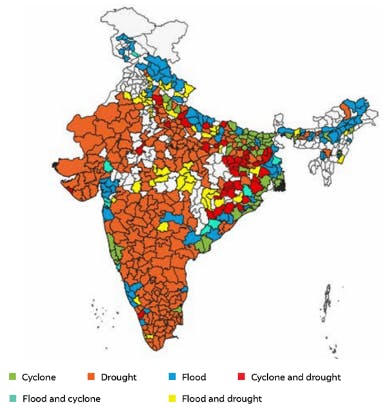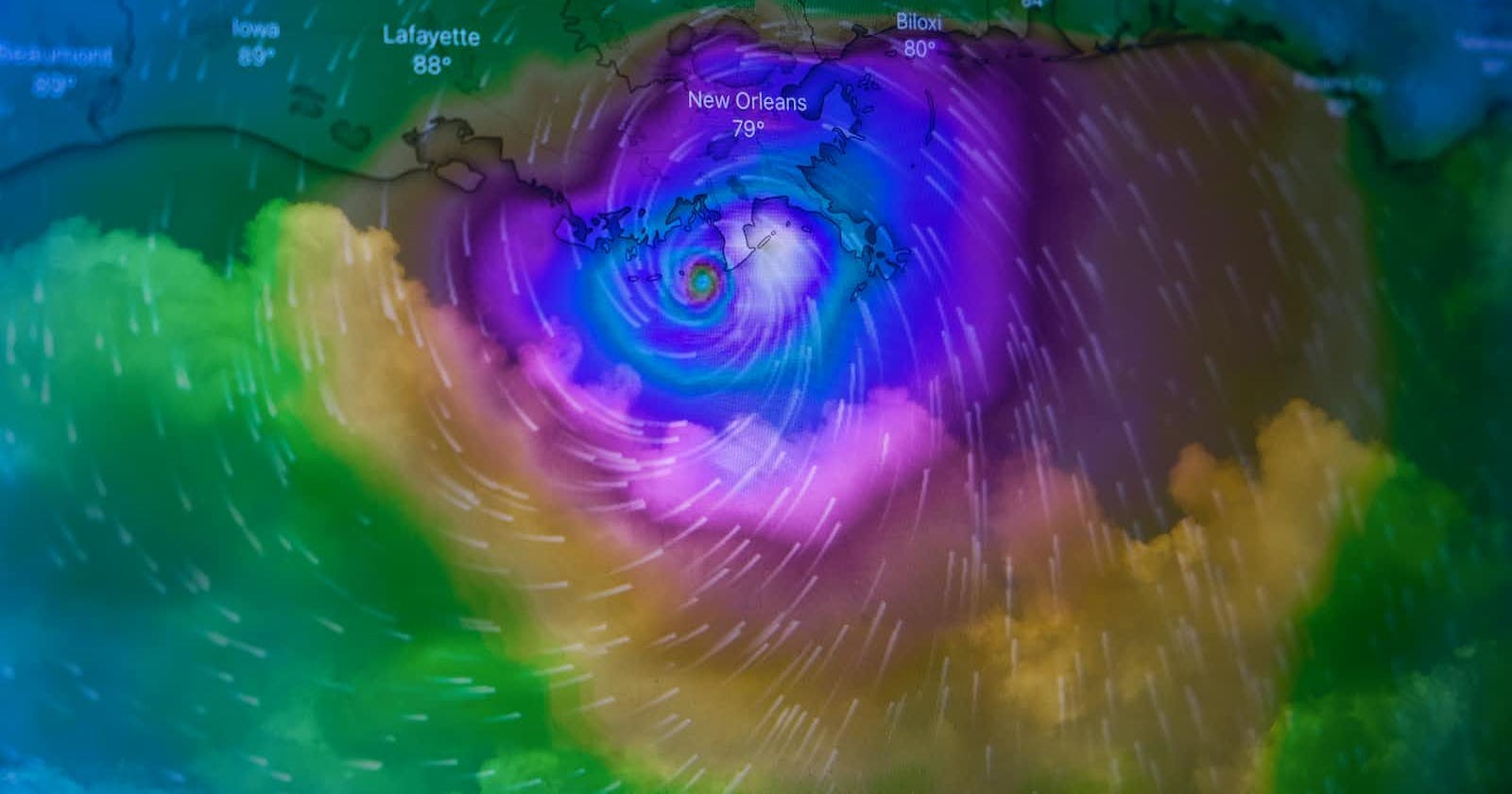“Everybody Talks About the Weather, But Nobody Does Anything About It.” attributed to 19th century humorist Mark Twain. Although quoted in jest, each year during the monsoon season- both southwest and northeast, for the denizens of India only feel the frustrations implicit in this quip. There is increasing evidence of strong upward trend in the occurrence of floods and related events since the 1970s (Figure 1), furthermore, over 75% of country are extreme climate event hotspots (Figure 2) (Mohanty, 2020 CEEW Report).

Figure 1 : Frequency of flood-related events over India - Mohanty (2020, CEVW Report)
Of course, Chennai residents will remember the devastating and once in a lifetime flooding event of 2015. Those who lived through it will have this etched in their memories for a long time. Similarly, the floods of 2018 in Kerala and the regular floods in Bihar, Mumbai etc. In addition, the country is also visited by frequent droughts due to a general decline in the seasonal average rainfall. This cognitive dissonance of decreasing seasonal rainfall while increase in extreme events will be the norm in the future under a warmer climate. This is (and should be) especially of pressing concern to the younger generation who will inherit this planet. The question on everyone’s mind is what can be done? Thankfully, there is lot that can be done, and we have the resources in all the sharp minds of young people.

Figure 2 : Extreme event hotspots. Mohanty (2020, CEVW Report)
Young people – you can do a lot about this! If you are looking for a career or line work that is meaningful and above all makes a difference and positive impact in the lives of ordinary citizens, this is where the country and society needs your brains and talent.
Weather and climate forecasting is advancing in leaps and bounds. Gone are the days when weather forecasters prepare hand drawn pressure maps each day to divine the intentions of the weather Gods to make forecasts. Today, this is a highly interdisciplinary field aided by increasing computational power, skillful mathematical, physical, and statistical models combined with real time data from satellite and radar. Furthermore, the opportunities in the weather and climate area encompass wide range of skills – climate science experts to enhance the weather and climate models, computer programmers to run the complex physical models in real time ingesting large amounts of data, statisticians to diagnose and infer the model skills, and even social science experts with basic knowledge of climate sciences to help communicate the information and many more!
This field can be broadly classified into two areas – weather and climate. Weather being short term – days, while climate is longer term – seasonal to multi-year. The basic training and methods are similar. The job opportunities are ever increasing. For, weather and climate pervade every aspect of socio-economic endeavor and there is growing recognition in the need to incorporate this in planning and management. Consequently, this has opened up fascinating opportunities hereto forth unimagined. Below is a partial list. Weather forecasters (the obvious and visible) for - National Meteorological agencies (IMD, in the case of India, NWS in the case of US), TV stations (weather channel and the like), Airlines (aviation meteorology), Shipping industry, Armed forces (Navy and Airforce in particular). On the Climate side opportunities include – seasonal climate forecasters for – climate service agencies (IMD, NWS, etc.), agriculture and cropping decisions and insurance, disaster preparedness, insurance, and derivatives (financial engineering), water resources planning, public health etc. The list of opportunities is growing significantly each year.
To make a meaningful career in core weather and climate – the best thing is to get a fundamental degree. To quote the legendary basketball player Michael Jordan – “Get the fundamentals down and the level of everything you do will rise.” Today that fundamental degree must include – Applied Mathematics, Physics (statistics, dynamics, and fluids), Computational skills (programming and logic), Statistics and Probability and, large scale data analysis. A B.Sc. degree from a top-notch college or University or, any B.Tech. degree in the traditional disciplines (Civil, Mechanical, Chemical and to some extent Electrical Engineering) will provide this essential foundation. Most of IISERs, especially Mohali, Pune and Bhopal offer BS-MS Dual degree in Earth Environment and Climate Sciences. In addition, Azim Premji University also has a 4-year B.Sc degree in Physics with courses in atmospheric sciences and climate. They also have a 4-year B.Sc. in Environmental Science and sustainability.
After B.Sc., a master’s degree in physics with a concentration in Atmospheric Physics or Meteorology or both or in combination with Ocean Sciences, will provide the strong preparation and skills for jobs or research. All the leading institutes – especially the older IITs – Madras, Mumbai, Delhi, Kanpur, and Kharagpur – offer M.Sc. in Physics or Earth Sciences with this concentration. These also offer Integrated M.Sc. after high school. The oldest and highly reputed institutions are Cochin University of Science and Technology (Dept. of Atmospheric Sciences), Andhra University (Dept. of Meteorology and Oceanography), IIT Kharagpur’s Center for Ocean, River, Atmosphere and Land Sciences (CORAL) and Savitribai Phule Pune University (Dept. of Atmospheric and Space Sciences). Savitribai Phule Pune University’s programs are jointly with Indian Institute of Tropical Meteorology in Pune – a premier institution for monsoon and global climate research in the world. Within the last decade Central University of Hyderabad also offers a M.Sc. in Ocean and Atmospheric Sciences through its Earth, Ocean and Atmospheric Sciences Center (CEOAS) and, so does IIT Bhubaneswar through its M.Sc. in Atmosphere and Ocean Sciences. Recently, IISERs, especially IISER Pune has a M.Sc. program in Earth Sciences for those after B.Sc. degree, which also has specialization in Atmospheric and Ocean Sciences.
After B.Tech. there are several opportunities to do a M.Tech. in Meteorology, Ocean Sciences, Atmospheric Sciences, Earth Sciences. These include Center for Atmospheric Sciences at IIT Delhi, (CEOAS) at Central University of Hyderabad, Pune University, Cochin and Andhra Universities (links above). IISC Bangalore has a M.Tech in Climate Science and recently IIT Hyderabad started a similar program in their newly constituted Department of Climate Change.
All of the above places also offer Ph.D programs and most of have integrated M.Sc. – Ph.D programs. If one is interested in pushing the frontiers of knowledge in climate sciences in general – where several intriguing and pressing questions await sharp minds to work on. In addition, National Institute of Oceanography, Goa, has Ph.D program in Ocean and Climate sciences, along with IISER Mohali, IISER Pune, IISER Bhopal and most of the MoES sponsored institutes also offer Ph.D programs. Overall, there are excellent institutions and researchers in India to obtain undergraduate and graduate degrees in any of the areas of climate science (atmosphere, ocean, land, cryosphere and interactions among them).
With a Masters degree combined with a solid foundation, the opportunities for impactful jobs in public, private and nonprofit sectors are widely available. There are several jobs yet to be imagined and created! For example, there is growing evidence of impact of climate and weather on construction safety and injury risk. Mitigating these risks will require climate and meteorologists with the broad foundation described above. I will not be surprised if soon, large engineering firms employ graduates in this field – something, one cannot imagine now. In addition, this is one of the best career fields that is recession and layoff proof! – for, there is always weather and climate.


